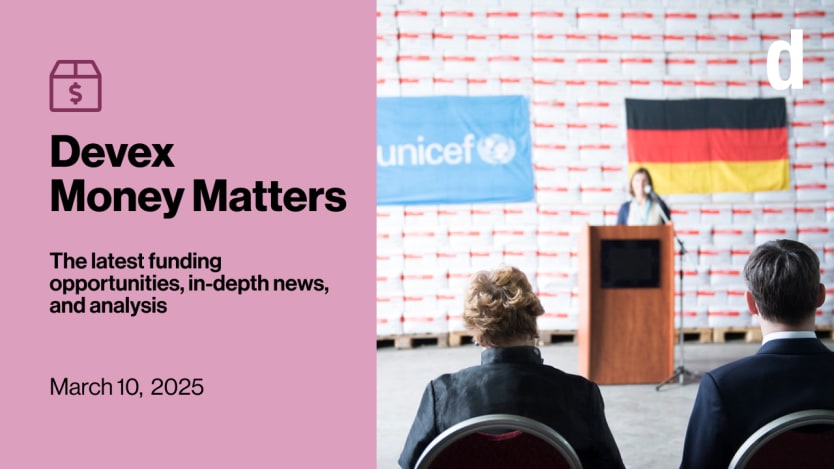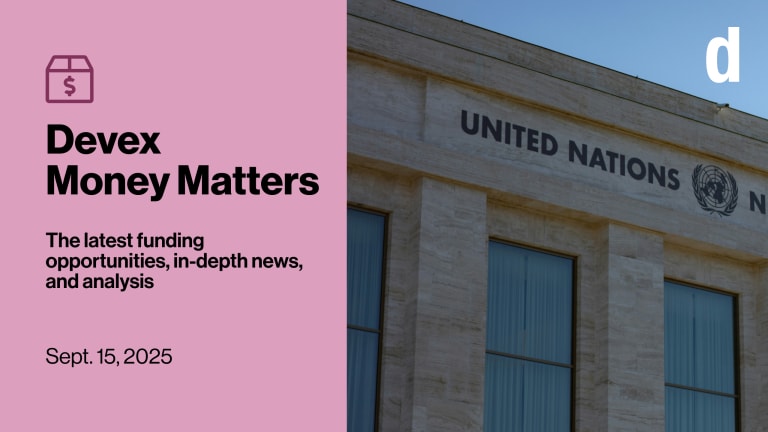
Things continue to move apace in the United States, with a significant victory for USAID suppliers, but a significant defeat for USADF and the Inter-American Foundation — two of the government’s smaller donor agencies.
Meanwhile, the collapse of the U.S. aid sector means that there’s likely to be a new top cat among donors: Germany. However, things don’t necessarily look so optimistisch there, either.
+ Are there topics you want to read more about in Money Matters? We want your feedback.
A new aid leader
This is a preview of Devex Money Matters
Sign up to this weekly newsletter and get the latest in development funding in your inbox every Monday.
Since 1960, the United States has been the world’s largest aid donor, due to its huge population and massive economy. But now, with so many of USAID’s programs canceled, it seems very likely that it will cede the top spot to Germany.
Despite having only around a quarter of the population of the U.S., Germany is still Europe’s largest economy, and it’s traditionally spent far more generously. In 2023, it spent nearly $38 billion on official development assistance, or ODA, compared to the U.S. on nearly $65 billion.
But Germany is making significant cuts, and there are major political challenges there too.
It’s part and parcel of a wider set of challenges for the rest of the world, which is struggling to respond to fill the gap left by the U.S. withdrawal.
We take a look at what it would take to make Germany the next aid leader, and give you a rundown on how it funds its programs.
Read: Is Germany the next leader in ODA, and how will it spend its money? (Pro)
Further reading: Funding cuts and culture wars — what the German election means for aid (Pro)
Go deeper: How will the rest of the world respond to lights-out at USAID? (Pro)
+ Not yet a Devex Pro member? Start your 15-day free trial now to access the event as well as all our expert analyses, insider insights, funding data, and more. Check out all the exclusive content and events available to you.
Funding activity
We publish tenders, grants, and other funding announcements on our Funding Platform. Here are some of the ones that have been viewed the most in the past 10 days.
The European Investment Bank has announced a €90 million ($97 million) loan to bolster food security and resilience in Egypt.
The World Bank has approved $192 million for a new project that will boost the private sector and improve disaster preparedness in Jamaica.
The African Development Bank signed a $1.5 million grant agreement to strengthen the energy sector and reduce the energy deficit in the Republic of Congo.
The Asian Development Bank is seeking firms for external verification of environmental and resettlement monitoring in the Philippines, with a $1.66 million budget.
The United Nations is providing a $1.68 million grant to support the livelihoods of persons with disabilities in Syria.
UNOPS is granting $8.2 million to improve access to assistive technology and related rehabilitation services for school-aged children in Pacific island countries
+ Try out Devex Pro Funding today with a free five-day trial, and explore funding opportunities from over 850 sources in addition to our analysis and news content.
Pay up!
For the embattled development community in the United States, there was rare good news last week, when the Supreme Court narrowly ruled that the U.S. government must pay its bills.
A lower court has since set the deadline for payment for an initial tranche of work as 6 p.m. ET today. After that, a timeline will be set for further funds to be released.
There’s still plenty to fight for here — not least because it’s far from certain, at this stage, that the government will actually release the cash as ordered.
And there was also bad news in another lawsuit, this one brought by contractors fired from USAID, after a judge declined to grant a temporary restraining order that would keep them in work.
Read: Trump administration ordered to pay select USAID partners by Monday
Read: Judge denies temporary order in USAID personal services contractors case
+ If you’re looking for ideas to diversify your funding in the new aid environment, Devex can help you. My colleague Raquel Alcega will be joined by experts from the field on Wednesday, March 12, at 10 a.m. ET (3 p.m. CET), to explore alternative sources of funding. This event is open to all Devex Pro members. Save your spot now.
DOGE ball
While it’s been good news for the implementer community, the bad news continues for donor agencies. Last week, we had the extraordinary spectacle of a literal siege at the U.S. African Development Foundation, with figures from Elon Musk’s Department of Government Efficiency, or DOGE, gathered outside the door while staff huddled inside.
After finally gaining admittance, DOGE acted rapidly to effectively close down the foundation.
And a similar fate has befallen another similar agency, the Inter-American Foundation.
Read: Trump administration rapidly guts the Inter-American Foundation
Read: DOGE takes over US African Development Foundation
Yes, minister
It’s not just within German and U.S. aid that things are shifting rapidly, though. Following the resignation of the U.K. development minister over her country’s plans for cuts to ODA, there’s a new figure on the job: Jenny Chapman, a longtime ally of Prime Minister Keir Starmer. Devex contributor Susannah Birkwood has broken down what we know so far about the new U.K. aid leader.
Read: Who is Jenny Chapman, the new UK development minister?
+ Tomorrow, March 11, I’ll be talking to experts in the United Kingdom about what happens to U.K. aid after the latest announcement of cuts. Devex Pro members can join us at 10 a.m. ET (2 p.m. in the U.K.) for a discussion about what might get cut, how the development sector can respond, and what opportunities there are to shape the future of the aid sector in the U.K. Register now.
Price index
Finally, a note for all of those who value transparency in aid data. The International Aid Transparency Initiative has confirmed it will not be providing financial support to Publish What You Fund, a U.K.-based organization, to produce the Aid Transparency Index. As a result, the next edition of the index, planned for 2026, has been canceled. The CEO of Publish What You Fund, Gary Forster, has set out what that could mean in practice.
Opinion: The 2026 Aid Transparency Index is canceled. Here’s what it means
ICYMI: Aid Transparency Index canceled for 2026
Sign up to Money Matters for an inside look at the biggest stories in development funding.








